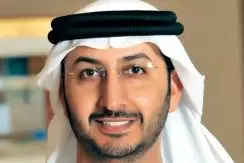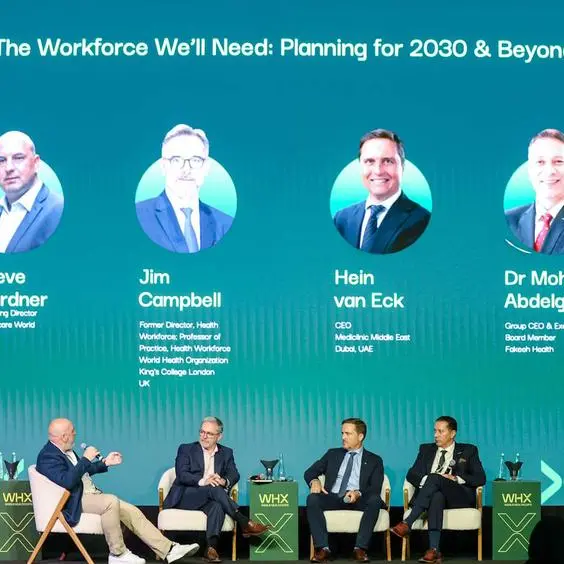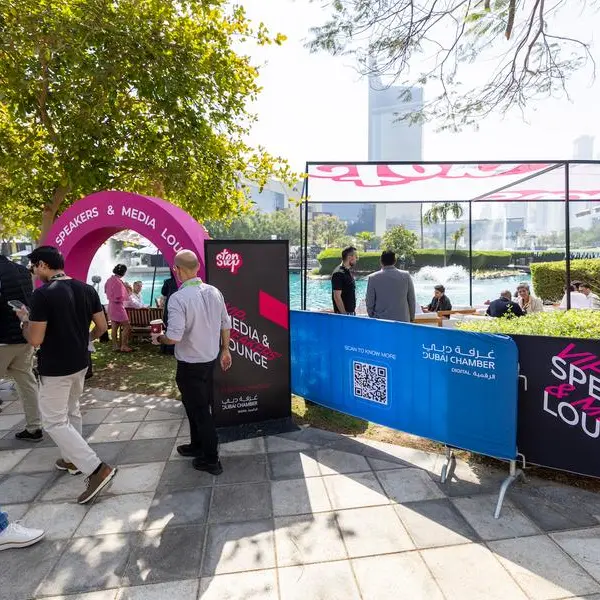PHOTO
AIM committee targets pan Africa FDI market, described as the fastest growing region globally, achieving 19-fold increase between 1990s and 2013
24 Gulf investors played a key role in the re-emergence of North Africa as a leading FDI destination in 2014, says EY report
Dubai, UAE, 18 January 2016: At a time when the African continent is witnessing fast growth globally in foreign direct investments (FDIs), a high-level delegation from the Annual Investment Meeting 2016 has conducted a pan African road show to strengthen the African participation in the forthcoming edition of the event.
The delegation stopped in many African countries in the north and south of Africa, and met a number of decision-makers in the government sector, as well as representatives from the private sector companies. The companies expressed their interest to participate and attend AIM 2016 being the world's leading emerging markets FDI platform.
The African road show followed successful meetings in a wide range of countries in Latin America, as part of promoting the event to international participants. These road shows come at a time Africa is making rapid strides in the FDI sector. According to Afrikaarrangement.com, Africa is the fastest growing FDI market in the world, as it witnessed 19-fold increase between 1990s and 2013, from USD 3 billion to USD 57 billion.
During the roadshow, AIM partnered with the South African Business Council (SABCO). Mr. Dawood Al Shezawi, CEO of AIM signed a memorandum of understanding with Mr. Aaron Darcy, Chairman, SABCO to enhance trade between the two countries and explore opportunities available for investment in both countries. Specifically, they discussed how AIM could facilitate and provide an opportunity for further communications between business and government institutions.
According to EY's attractiveness survey - Africa 2015 - Making choices, capital investment into the continent surged to US$128b, up 136%. FDI created 188,400 new African jobs, a 68% increase. Spurred by a handful of megadeals, the average investment increased to US$174.5m per project, from US$67.8m in 2013. Africa's share of global capital investment and job creation hit an all-time high in 2014.
"FDI in Africa is one of the main effects of globalisation in the past twenty years, which had its impact on strengthening the competitiveness of the national companies from 1990 to 2013," said H.E. Abdulla Al Saleh, Undersecretary, UAE Ministry of Economy, Foreign Trade Sector, Chairman of AIM's Higher Organising Committee. "We targeted the African market in our global road shows because it has big experience in this area, and the presence of African participants at AIM 2016 will further the magnitude of our global event," he added.
AIM 2016 will be held between 11 - 13 April, 2016 at the Dubai International Convention and Exhibition Centre under the patronage of HH Sheikh Mohammed bin Rashid Al Maktoum, Vice President and Prime Minister of the UAE and Ruler of Dubai,
"We understand the importance of the African market in this sector, as we were briefed on the FDI success in Africa in bridging many gaps in investments, not to mention its contribution in technology transfer," added Al Saleh.
There are two trends defining Africa's future growth path including rising urbanization and a growing consumer class. In line with these trends, FDI data reveals strong inflows into real estate, hospitality and construction (RHC) in 2014. Three consumer-facing sectors -- technology, media and telecommunications (TMT); financial services; and consumer products and retail (CPR) again attracted the largest share of investor activity. Respondents to a survey were excited about prospects in the relatively underexploited agricultural sector. EY believes that Africa now has the potential to bring about a future that would have been unimaginable a generation ago. But to realize this potential, African leaders will have to drive the structural transformation necessary to achieve the goals of inclusive and sustainable growth.
The continent, which becomes the world's second-largest destination for FDI capital inflows, will see a US$16b plan by French oil major Total to develop the Kaombo offshore oil project in Angola, in a joint venture (JV). This project is expected to produce 230,000 barrels per day from reserves estimated at 650m barrels. Also, announcement by Greece-based Mac Optic to invest US$10b in Egypt, including US$4.8b to construct a new refinery with a production capacity of 250,000 barrels per day and US$5.2b to construct a petrochemical plant.
Both projects will be situated in the Gulf of Suez. Similarly, an agreement with the Nigerian Government worth US$5b signed by SkyPower FAS Energy, a JV between SkyPower Global and FAS Energy, to build 3,000 megawatts of solar photovoltaic (PV) projects in the country. Another key initiative is Power Africa, intended to add more than 30,000 megawatts of electricity generating capacity across the continent and double the number of people in Sub-Saharan Africa who have access to power.
"According to EY report, Africa attracted more FDI funding than North America, Latin America and the Caribbean, and Western Europe, which historically draws significantly higher FDI flows than Africa. AIM 2016 is set to display very promising opportunities from Africa. Decision-makers will attend the event to meet with investors to discuss mutual cooperation," said Dawood Al Shezawi, CEO of AIM's Higher Organising Committee.
Nigeria, now Africa's largest economy after rebasing its GDP last year, attracted 49 FDI projects in 2014. Egypt and Morocco, the region's dominant economies, are benefiting most from the rebound in investor appetite. Aided by a return to stable government, Egypt reclaimed its ranking as the second-most attractive FDI destination in Africa during 2014, attracting 71 projects, an increase of 61.4% on 2013. Also, Morocco became the third-largest recipient of foreign investment in Africa in 2014, with 67 FDI projects, up 52.3%. French companies outpaced Spanish rivals to become Morocco's leading external direct investors in 2014. Mozambique garnered 50 FDI projects in 2014, moving up two places to become the fifth-largest recipient of FDI projects in Africa. In 2014, Ethiopia emerged as the 8th-largest recipient of FDI projects in Africa, up from 14th position in 2013. FDI in Ethiopia is typical: Although the 32 projects launched there last year accounted for only 4.4% of the African total, and involved relatively small sums, they provided an astonishing 18.5% of FDI jobs in Africa.
"The US becomes the largest investor in Africa, while the UAE, France, China and Portugal expand presence in the continent. US investors accounted for 13.8% of total FDI projects in Africa, an increase from a 9.8% share in 2013. The UAE became the fourth-largest source of FDI projects in Africa in 2014, moving up a place. UAE companies now invest more money in Africa than those of any other nation, and create the most jobs," said Al Shezawi quoting EY report.
Indicative of a major investment are the moves by UAE retailers to invest US$2.3b in Egypt over the next four to five years. Moreover, 24 Gulf investors played a key role in the re-emergence of North Africa as a leading FDI destination in 2014. Companies from the Middle East have historically enjoyed close cultural and business ties with North Africa, particularly Egypt and Morocco. Companies from the oil-rich Gulf States increased their share of African FDI projects to 9.1% in 2014. Saudi Arabian companies took on a bigger role, launching 11 FDI projects in Africa last year, up from just 3 in 2013. Middle Eastern investors were especially strong in RHC (26.9% of their projects), financial services (20.9%) and CPR (19.4%).
The United Nations Conference on Trade and Development (UNCTAD) 2015 report pointed out that FDI to Africa remained stable, reaching to USD 54 billion in 2014 for the continent as a whole, with Egypt accounted for 14%, reaching to USD 4.8 billion, and Morocco accounted for 9% worth USD 3.6 billion.
The same report also revealed an increase in FDI in the gas sector in Tanzania, and Ethiopia became the center of a multinational producing clothing and textile companies. The Central African region received investments worth USD 12 billion in 2014, up by 33% compared to 2013, and almost doubled in Congo amounting to USD 5.5 billion, making its market the second in Africa to receive FDI despite lower commodity. As for South African region, it has received investments worth USD 10.8 billion in 2014, securing its forefront position in the African market in this domain. The country of South Africa received investments worth USD 5.7 billion in 2014, while Mozambique got investments worth USD 4.9 billion to secure its position in third place thanks to the possibility to be one of the largest liquefied natural gas exporter in the world.
The roadshow included Accra in Ghana, the Ouagadougou in Burkina Faso, Addis Ababa in Ethiopia, in addition to the Abidjan in Ivory Coast. The delegation discussed with decision-makers the key features of the next edition of AIM and the FDI opportunities in African countries.
During the visit, the delegation met with members of the Economic and Monetary Union of West Africa (UMOEA), who confirmed attendance at the event this year.
Also, Mr. Walid Farghal, Director General of the Annual Investment Meeting Higher Organising Committee highlighted the advantages of participating at AIM. Farghal also discussed with Dr. Akinwumi A. Adesina, President of the African Development Bank the possibility of establishing an Arab-African Fund dedicated for energy and infrastructure investments in the African continent.
During the three-day trip to Burkina Faso, AIM delegation met with members of West African Economic and Monetary Union (UEMOA). In the meeting wherein AIM conference program and activities were discussed, Farghal emphasized: "AIM is a meeting where investors and project sponsors discuss and explore new business opportunities that generate tangible and fruitful results. Project leaders have the opportunity to talk directly with investors and to build partnerships for the implementation of their projects."
In addition to B2B meetings, exhibition of projects and services, a debate of world leaders, visit to UAE companies, participants can anticipate a conference that will address, among other things, trends and new forms of FDI, investment strategies of new global players, investment policies and strategies of sovereign wealth funds.
In view of the planned activities, Farghal said that AIM 2016 will be very advantageous for FDI project leaders. "In the event, there is a good opportunity to find investors to implement proposed projects. This will help create jobs and reduce youth unemployment, one of the big problems in Africa." He further explained: "To participate, they must register online on the portal of AIM. This will give them access to a platform which lists all projects and investors. Thus, each party can choose what interests them pending the meeting during the AIM."
The series of meetings proved to be fruitful as participants reiterated their commitment to attend the event. API-BF, Honoré K. Kiétyeta welcomed the visit of Farghal in Burkina Faso despite the condition in the country. "It comforts us that despite everything, Burkina Faso remains to be an attractive country. Given the importance and impact of AIM, as well as the quality of its participants, we will promote the event and encourage project leaders to seize this great opportunity to realize their projects," he said. He also revealed that several projects including the international airport of Donsin-Ouagadougou have attracted interest from several investors at the 5th edition of AIM last April, and thus they are looking forward to the upcoming edition happening on April 2016.
"All markets of the world, regardless of its development scale, target FDIs due to its high returns on the host countries. For example, UAE FDI flow is set to witness strong growth during the next five years of between 20 to 25% per annum, as an analytical study issued by the Chamber of Commerce and Industry (DCCI), with expectation to amount to AED 48 billion (USD 13.1 billion)," said Al Saleh.
Real estate, infrastructure and consumer sectors attract the major number of FDIs to Africa. EY report continues that fixing Africa's infrastructure deficit and rising demand from its growing population offers ample opportunities for foreign investors in infrastructure development. Poor roads, ports, rail links and connections slow economic growth and hamper business productivity. International hotel chains are also striving to meet burgeoning demand in Africa, where supply of hotels in all categories is often inadequate. Also, financial services is the second-largest sector by project numbers, and increasingly driven by intra-African investment. Last year, about 40% of cross-border financial services projects were launched by African companies. Foreign investors launched 103 consumer products and retail projects in 2014, making it the third-favorite sector for FDI. In addition, almost a fifth of African investment projects in 2014 were in technology, media and telecommunications. Lastly, agriculture is seen as a future growth sector in the continent, as they believe agriculture is the most promising growth opportunity in Africa, ahead of mining and metals. Almost a third of business decision-makers identified agriculture as a vital driver of future growth. "EY report said that Africa has nearly a quarter of the world's arable land, but produces only 10% of global agricultural output," said Al Shezawi.
"Africa is witnessing increasing mergers and acquisitions across borders, as investors are keen to benefit from the growing consumer markets in the emerging continent. Being the most awaited FDI event in the region, AIM will throw light on the developments in this sector internationally, so it was essential to explore many opportunities in a vital market like Africa. We expect to see wide range of investment opportunities in Africa during AIM 2016, as we have already confirmed many of them," added Al Shezawi.
A joint study by the African Development Bank (AfDB), the organization for Economic Cooperation and Development (OECD), and the United Nations Development Program (UNDP), estimates that external financial flows to Africa have quadrupled since 2000.
"External capital inflows are vital to the well-being of African economies. In 2015, they are forecast to equal 7.2% of the continent's GDP. Not only have these flows grown rapidly overall, but their sources have changed fundamentally," concluded Al Shezawi.
The Annual Investment Meeting is the first of its kind in terms of presenting investment opportunities under one roof and strengthens its role as a catalyst for investment in emerging markets and the fast-growing economies. This edition will focus on FDI and exchange practices and international experience in various investment areas. AIM will also provide an opportunity for decision-makers to explore the prospects for the economies of emerging countries in light of the rapid changes taking place in the world.
-Ends-
For further information, please contact:
Virtue PR & Marketing Communications
P.O Box: 191931
Dubai, United Arab Emirates
Tel: 00971 4 4508835
Email: info@virtuemena.com
Website: www.virtuemena.com
© Press Release 2016



















